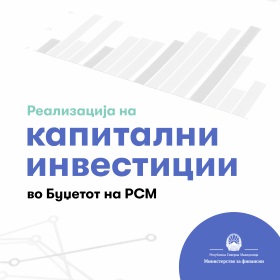20th December 2020, Skopje – Parliament adopted the 2021 Budget. This is the first medium-term budget presented before and adopted by the Parliament, within which the economy is projected to grow by 4.1% next year and budget deficit is projected to decline by 3.6 percentage points in relation to this year’s. As pointed out during the Budget presentation, main goals are to preserve the citizens’ health, support the economy, as well as accelerated growth and structural reforms.
-The Budget comprises three main priorities – health sector, economy and preserving job stability, rule of law and integrations. The Budget is precise, exact, with a development component. Capital investments are higher by 26.2% compared to this year’s Budget, accounting for 3.4% of GDP or our country’s average back in the better years. EUR 100 million more is projected for the health sector compared to 2019, i.e. EUR 40 million more compared to the current year. Capital investments in the education sector are increased by four times. Funds are projected for all challenges next year, as well as for suppression of COVID-19 crisis, if needed, Minister of Finance Besimi pointed out.
Next year’s Budget is a budget aimed at recovery from the COVID-19 induced crisis, as well as setting the basis for accelerated economic growth in the period to come. It is the first medium-term budget adopted, being based on three platforms: A. 2021-2025 fiscal consolidation, reducing the budget deficit to 2% by 2025, i.e. below the Maastricht criterion, B. Strategy for Economic Recovery and Accelerated Growth, aimed at doubling the growth by 4-5% in the coming period and C. 2021-2025 Public Investments Plan, aimed at increasing the share of investments in the total expenditures and improving their execution. Budget funds are also projected for support to both the citizens and the economy: EUR 664 million is allocated to the health sector, EUR 1.47 billion to social protection, EUR 465 million to the education sector, EUR 1,141 billion to economy development.
Total revenues of the 2021 Budget of the Republic of North Macedonia are projected at Denar 212.6 billion, being higher by 8.3%% compared to the second 2020 Supplementary Budget, while expenditures are projected at Denar 247.5 billion, being lower by 2.1% in relation to the second 2020 Supplementary Budget. Thus, budget deficit is projected at 4.9%, being by almost twice lower compared to this year. Fiscal consolidation policies are expected to provide for gradual narrowing of the budget deficit each year, hence, it is projected to -3.8% in 2022, -3.2% in 2023, -2,9% in 2025 and -2% in 2025, being below the Maastricht criterion of -3% of GDP.
Strategy for Economic Recovery and Accelerated Growth is based on four pillars: economic recovery from the Coronavirus crisis, accelerated, sustainable and inclusive growth, increased competitiveness and networking with the global supply chains and human capital investments. The first pillar, economic recovery from the Coronavirus crisis, covers the following priorities – protection of the citizens’ health and social protection of the most vulnerable groups in the society, as well as support to the economy, the private sector and job protection. The second pillar, accelerated, sustainable and inclusive growth, focuses on good governance (rule of law, eradicating corruption and capacity building of institutions), fiscal sustainability, macroeconomic and financial stability, local and equal regional development, sustainable and healthy environment, green economy and digitalization of the economy and the public services, under which various measures and activities are envisaged. The third pillar, increased competitiveness, focuses on strengthening the trade links and integration into the global value chains, improving the business environment and combating the shadow economy, improving the access to finance and technology adaptation, and modernization of agriculture. The fourth pillar, human resource development and equal opportunities, covers human resources development (education, science and health), intensified activity of the working age population and social protection and social security, under which various measures and activities are envisaged.
Accordingly, under the medium-term projections, growth will double in the coming five-year period, i.e. 4.6% growth in 2022, 5.2% in 2023, 5.6% in 2024 and 5.9% in 2025. Average economic growth rate is expected to stabilize to 5.75% annually in the period 2026-2030.
During the parliamentary Budget debate, 18 amendments were accepted, hence additional funds for energy efficiency were allocated – the measure for procurement of energy-efficient windows and doors for the households, establishment of eco-zones, accreditation of a central environment laboratory, agriculture machinery for small family-owned wineries, utility infrastructure in many inhabited regions, social allowances for redundant workers, construction and reconstruction of two schools in Gostivar.















